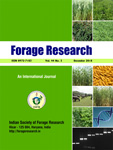LONG TERM EFFECT OF INTEGRATED NUTRIENT MANAGEMENT ON PEARL MILLET-WHEAT CROPPING SYSTEM – A REVIEW
PAWAN KUMAR,BABLI,UMA DEVI,MANOJ KUMAR,DHEERAJ PANGHAAL*AND SATPAL
Department of Agronomy, Department of Soil Science, Forage Section, Department of Genetics & Plant BreedingCCS, Haryana Agricultural University, Hisar-125 004, (Haryana), India
*(e-mail : dheerajpanghal27@gmail.com)
(Received : 28 June 2019; Accepted : 26 September 2019)
SUMMARY
Food security for a huge country like India, with high density of population in general and below poverty line is of vital importance. India has to produce around 300 mt of food grains by 2025 A.D. to nourish over 1.4 billion population from 0.15 ha land per capita or less. To feed this burgeoning population, many intensively cropped cereal based cropping systems are under cultivation in the country. Pearl millet [Pennisetum glaucum (L.) R. Br. Emend. Stuntz.] – wheat (Triticum aestivum L.) is one of the important cropping systems of the country and spreads over arid eco-region; semi-arid eco-region with alluvium derived soils. Higher food production needs higher amount of plant nutrients. To avoid wastage of resources and to reduce the environmental damage, there is a need to develop and demonstrate balanced use of organic/inorganic fertilizers. This will not only ensure the crop production in a sustainable way but also sustain the crop production system. As no single source of nutrient is capable of supplying the balanced amount of nutrients, integrated use of all sources is a solution to supply balanced nutrients. Long term studies being carried out at several locations on different cropping systems indicated that application of all the needed plant nutrients through chemical fertilizers has deleterious effect on soil health. Since, the nutrient turnover in soil-plant system is considerably high under intensive cropping system. So, neither the chemical fertilizers nor the organic/biological sources alone can achieve production sustainability. Even with the so called balance use of NPK fertilizers in long term studies, higher yield levels could not be maintained for years because of emergence of secondary and micro-nutrient deficiency and deterioration in the soil physical properties. Organic manure alone or in combination with inorganic fertilizers are known to have favourable effect on soil and can correct marginal deficiency of secondary & micro-nutrients and interns will ensure efficient supply of applied nutrients. Therefore, there is need to strengthen nutrient supply system especially through INM for sustainable production of this cropping system. Use of chemical fertilizers in conjunction with FYM, vermicompost, green manure, wheat straw etc. have proven good for sustainability of pearl millet- wheat cropping system which have been thoroughly discussed in this review.
Key words:Pearl millet-wheat cropping system,productivity, OC, INM, FYM, fertilizer
81-94

